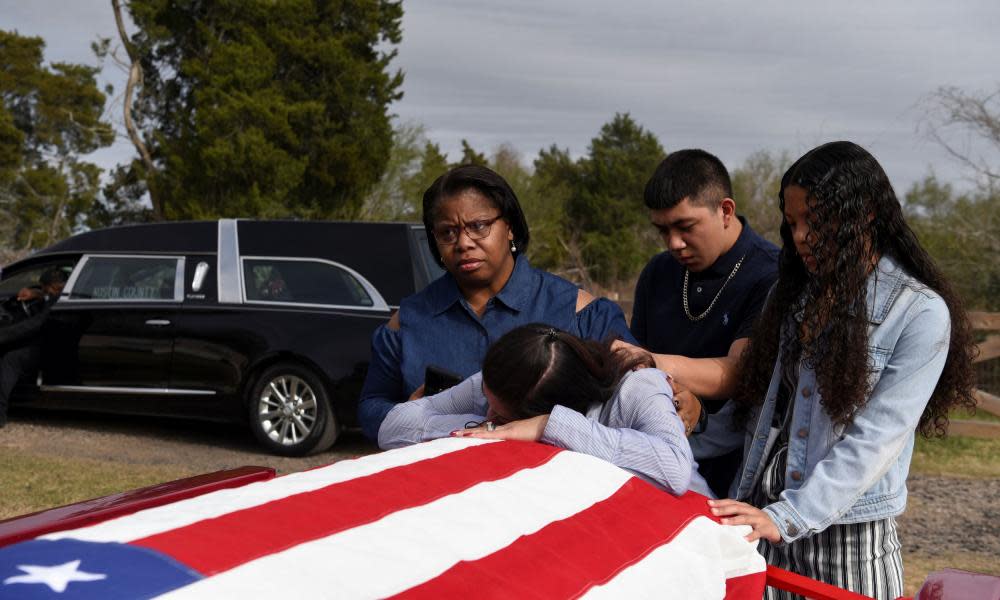500,000 Americans have died of Covid. Will we wake up to our own callousness?

As the United States marks the terrible milestone of half a million souls lost to Covid-19, these deaths demand a grown-up conversation about the policies that shape our public life. When we look at the impact of this pandemic on other wealthy nations around the world, the disproportionate death toll we have sustained in the US exposes a basic failure of national security. Though we spend more than the next several nations combined on our military budget, our government was unable to protect its citizens against a deadly pathogen.
The Centers for Disease Control and Prevention (CDC) reported this week that, during the first six months of the pandemic, life expectancy for the average American dropped by a full year. For African Americans, the impact was nearly three times as severe, exposing persistent systemic racism that was not corrected when corporations agreed to say “Black Lives Matter”. We have not simply suffered a disaster. This disaster has unveiled dysfunction in our society.
As I listen to our ongoing conversation about what a rescue plan for America should include, I hear a dysfunction more basic than infrastructure, investment or partisan disagreement. The very language we use to talk about how we might respond to this crisis is insufficient. It does not allow us to tell the truth about either the problems we face or the possibilities to address them.
As a parent, I remember having to explain the world to my children in simple terms when they were young. Whether or not the stove was on, it was “HOT!” No matter how clumsily they tried, every attempt at a new skill was praised with, “GOOD JOB!” We communicate with children in the simplest of terms because their growth and development demand it. But there comes a time when it would be insulting and counterproductive to not offer children a more nuanced understanding of the world. Eventually, we have to learn to have grownup conversations.
For far too long in American public life, we have accepted the simplistic framing of any attempt to establish justice or address systemic inequality as “far-left” or “progressive”. This framing has persisted even as issues like universal access to healthcare or raising the minimum wage have gained the support of a vast majority of Americans. If “far-left” issues are the concerns of a fringe minority of the American public, how did 80 million Americans in 2020 vote for a president who promised to make sure everyone has access to healthcare? How did the state of Florida, which Donald Trump won in 2020, vote on the same ballot to raise their state minimum wage to $15 an hour if raising the minimum wage is a concern of the “far left”?
It is insulting to a people who have lost half a million parents, grandparents, siblings and partners to continue talking about the root causes of a national crisis in simplistic terms that do not fit the reality we can all see. In the US Congress, where the issue of raising the minimum wage to $15 an hour is being debated as part of Biden’s American Rescue Plan, we are told that “moderate” Democrats are hesitant to support the measure. But what is moderate about denying just wages to the frontline service workers whom we’ve called “essential” throughout this pandemic? These poor workers are disproportionately Black and Latino, though the largest racial group in raw numbers is white. Senators like West Virginia’s Joe Manchin think they are guarding against the power of Trump’s fake populism among their white base by hedging on bold action to raise wages. But this simplistic framing plays into the divide-and-conquer tactics that pit poor white people against their Black and brown neighbors by telling them that the “far left” wants to take away their jobs and their freedoms. When we repeat the lie that raising the minimum wage is a “far-left” idea, we implicitly suggest that it is something the sensible people of West Virginia would never support.
The same is true of healthcare. Politicians who get free healthcare just because they have been elected to public office suggest that guaranteeing every American access to healthcare is a “far left” position. But it was first proposed by Theodore Roosevelt, a Republican, a century ago. Eighty-seven million Americans are uninsured or underinsured in the midst of a global pandemic and many of them have not been able to follow public health advice about social distancing because their economic circumstances require them to go to work at frontline service jobs. These are the families that have borne the brunt of half a million deaths. But their suffering is not separate from their more wealthy neighbors. As local health systems have become overwhelmed by Covid patients, we have witnessed that they are not able to care for some people no matter how much money they have.
It may sound simplistic to some to suggest that half a million deaths demand we change our language. But I am reminded of what the philosopher Ludwig Wittgenstein said: “Words make worlds.” We cannot see the solutions that our very words prevent us from naming. Until we can honestly name the challenges we face, there’s little hope we can meet them. As James Baldwin said: “Not everything that’s faced can be changed, but nothing can be changed until it has been faced.” It’s past time we face the need for policy solutions that our language has allowed us to too easily dismiss.
Bishop William J Barber, II is president of Repairers of the Breach and co-chair of the Poor People’s Campaign: A National Call for Moral Revival. He is author of We Are Called to Be a Movement

